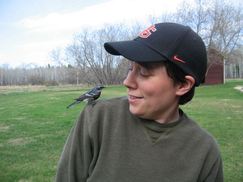
Background:
I have a PhD in Zoology from Oregon State University, which I completed following my Bachelor's degree in biology at Western Oregon University. Prior to attending WOU, I spent nearly three years living in Scotland where I began college taking a number of science courses first at Perth College and later at the University of Stirling. After finishing my PhD, I went abroad again to pursue a postdoctoral research fellowship at Linköping University in Sweden. Being immersed in Scottish and Swedish cultures were amazing experiences that I enjoyed immensely.
My current position is that of Collaborative Project Coordinator at the University of Maine's Center for Research on Sustainable Forests.
Research:
I am a behavioral ecologist with broad interests in animal behavior and physiology, particularly in the context of reproduction and parasites/disease. My dissertation research focused on the reproductive implications of parasitic infections and immune challenges in garter snakes and included a substantial field work component in Manitoba, Canada. My postdoctoral work focused on behavioral manipulation by parasites infecting sticklebacks.
I initially came to OSU interested in studying chemical ecology, specifically how pheromones help maintain reproductive isolation. However, as I worked with the snakes, I also became fascinated with their parasites and the possibility that a female snake's parasite burden might affect the chemical profile of her sexual attractiveness pheromone and/or that a male's burden might alter his perception of the pheromone and thus affect mate choice decisions. Over the course of my PhD research, my interests expanded to include fields beyond chemical ecology and led me to investigate other potential fitness consequences of parasitism, such as effects on gamete (sperm/egg) production, ejaculate traits, and courtship/mating behaviors. Ecoimmunology is another interest of mine, and I have explored how immune challenges impact reproduction. From my postdoctoral work, I also became interested in how anthropogenic factors influence animal physiology and behavior, including how these factors may affect host-parasite interactions. For more details of my work, please see the research section of my website.
Science Communication:
Communicating science is an important part of being a scientist. As a freelance editor, I have worked with scientific journals as well as individual clients to polish technical publications. A key aspect of this work is providing constructive feedback that can help authors become better writers. Clear writing makes research more accessible to readers.
Although technical publications are crucial for sharing results with fellow scientists, science is not just for scientists and communication with more diverse audiences is needed. To this end, I write popular science content and am involved in community outreach activities. My recent work in science communication includes writing a natural history column for a local newspaper and contributing to lifelong learning programs at retirement communities as well as developing technical writing workshops for graduate students.
Project Management:
Another crucial part of science is the management of projects--often multiple projects simultaneously, which requires a great deal of organization and attention to detail. I enjoy the challenge of balancing a variety of tasks and coordinating with diverse audiences. My skills in project management were initially developed through my teaching and research activities. I am currently working toward an MBA degree to further enhance my managerial skills.
Contact Information:
Emily J. Uhrig, PhD
Collaborative Project Coordinator
Center for Research on Sustainable Forests
University of Maine
[email protected]
https://www.researchgate.net/profile/Emily_Uhrig
